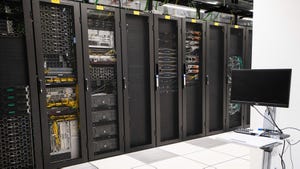The Pros and Cons of Public Cloud Storage for Data Center BackupsThe Pros and Cons of Public Cloud Storage for Data Center Backups
Is public cloud storage the right solution for your data center backups? Weigh the benefits of flexibility and cost savings against the potential risks.

Data backups can quickly consume large amounts of storage space, especially when running workloads in a private data center or colocation facility with limited capacity. In such cases, public cloud storage may seem like an ideal solution for data center backups – and often, it is. However, using the cloud for backup storage can also present challenges.
If you’re considering whether public cloud storage is the right solution for your data center backups, it’s important to weigh both the benefits and potential drawbacks. While the cloud can offer flexible storage options, it may not always be the best fit.
Here’s a breakdown of how cloud backup strategies work and when they can deliver the best results.
How Can the Cloud Help with Data Center Backups?
Let's begin by clarifying what we mean when discussing using the public cloud to store data center backup data.
Backing up workloads hosted in a private data center or colocation facility requires copying data from a production environment to backup storage. If something goes wrong with your production environment – such as a cyber-attack that wipes out your data or a natural disaster that destroys your servers – you can use the backups to restore your systems.
If you want, you can store backup data inside the same data center that hosts your production workloads. But you can also choose to store the data inside a public cloud, like Amazon Web Services (AWS), Microsoft Azure, or Google Cloud. This is a form of cloud backup.

Understanding how public cloud storage integrates with your data center can help optimize backup solutions and resource management.
The Advantages of Cloud Backups for Data Centers
Why would you want to copy backup data into the cloud instead of keeping it in your data center? There are three main reasons:
The cloud offers virtually infinite storage capacity. This means you can store as much backup data as you need, without having to scale up the storage infrastructure inside your own data center.
Cloud data services are typically low in price, costing just pennies per gigabyte per month. In some cases, this may be more cost-effective than building and managing your own backup storage infrastructure.
Storing backup data in the cloud means that your data will remain safe even if your data center is compromised.
In short, the cloud may offer a scalable, cost-effective, low-risk way to store backup data.

Top public cloud storage providers include Amazon Web Services (AWS), Google Cloud, and Microsoft Azure.
The Downsides of Public Cloud Storage for Backups
While there are numerous potential benefits, moving backup data to the public cloud could lead to some challenges, including:
Compliance and data privacy challenges. While the cloud is not any less inherently secure than a private data center, moving data to the cloud may lead to compliance issues in instances where an organization must keep sensitive information within a specific geographic region, for example.
The risk that over the long term, cloud storage costs will exceed what you’d pay to store data on your own infrastructure.
The fact that, although cloud backups provide some reliability benefits by ensuring that your data center backups are stored off-site, there is still a chance that cloud backup data could be deleted. For instance, an employee might accidentally delete cloud backups.
Slower data recovery, since you'd be relying on the internet to move data from the cloud into a private data center if you need to restore your systems to private infrastructure. If you have many terabytes of data to restore, transferring it over the web could take days – whereas it might take just hours if your backup data and recovery infrastructure reside in the same facility, and you can transfer information over a local network.
The cloud is not always a cheaper and more reliable way to store backups. It might complicate your data center compliance strategy and slow down data recovery.
Read more of the latest data center storage news and analysis
Going Public: When Cloud Backups Make Sense
Whether the cloud is the right storage solution for your data center backups depends on several factors, including what it would cost you to store the backups on your own infrastructure, whether you are subject to compliance rules that make cloud backups complicated, and how fast you need to restore data in the event of an outage.
We can’t tell you what these considerations mean for your organization. But we can tell you that, while cloud backups have clear advantages, you’ll want to consider the potential downsides before assuming that the cloud is necessarily the best place for your backup data to reside.
About the Author
You May Also Like









